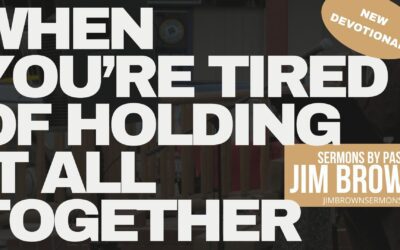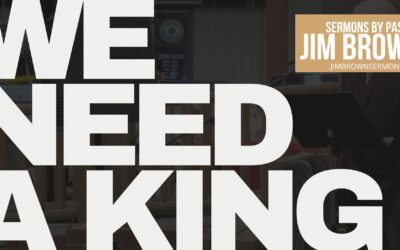December 13, 2024
EP 5: BE REAL | Embracing Biblical Wisdom
Psalms
Authentic Faith Rooted in Biblical Wisdom
Are you ready to get real about your faith? Dive into the heart of Biblical wisdom with this honest, relatable message that explores Psalms scriptures and the timeless truths they reveal. From learning to trust in God to embracing authentic praise and worship, this sermon will challenge and inspire your spiritual walk. Don’t just read it—experience it!
Sermon Study Resources
Sermon Notes
Your Subtitle Goes Here
Sermon Notes: Be Real | Embracing Biblical Wisdom
Introduction
- Opening Thought: Sometimes life and scripture feel confusing, but God invites us to Be Real in our faith.
- Personal Story: Cutting a hole in the wall—emphasizes understanding situations fully before acting.
- Key Verse: “Trust in the Lord with all your heart and lean not on your own understanding.” (Proverbs 3:5, ties to Biblical wisdom and trusting God).
Understanding the Psalms
- The Psalms are poetic expressions of faith, not standalone doctrines.
- Themes in Psalms:
- Trusting in God (Psalms scriptures like Psalm 118:8).
- Worship and Praise (praise and worship as seen in Psalm 150:6).
- Honest cries for help and confession (trust in God Bible verse insights).
Psalms: A Framework for Real Faith
- What Are Psalms?
- Poetry collected over centuries; five books within the Book of Psalms.
- Reflect personal and communal expressions of faith.
- Hebrew Poetry:
- Use of parallelism: phrases that expand or contrast ideas for deeper understanding.
- Example: Psalm 23—“The Lord is my shepherd; I shall not want…” conveys God’s care holistically.
Key Types of Psalms
- Psalms of Penance: Focus on confession and restoration.
- Psalms of Praise: Celebrating who God is and His works.
- Wisdom Psalms: Offer guidance on living faithfully (Biblical wisdom verses).
- Imprecatory Psalms: Honest cries for justice, reflecting raw human emotion.
Real Lessons from Psalms
- Biblical Wisdom in Action:
- Acknowledge God’s sovereignty over all circumstances (Psalms scriptures and trust in Him).
- Be honest with God—He can handle our raw emotions.
- Trust in God Bible Verses:
- Psalm 22:1: “My God, my God, why have you forsaken me?”—An expression of felt distance, not a loss of trust.
- Psalm 118:8: “It is better to take refuge in the Lord than to trust in humans.”
Application for Today
- Be Real with God:
- Bring joys, sorrows, doubts, and victories to Him.
- Authentic faith builds a deeper connection.
- Embrace Worship and Praise:
- Balance raw emotion with trust in God’s goodness.
- Psalms like Psalm 150 remind us to celebrate God’s sovereignty.
- Seek Biblical Wisdom:
- Learn from the entire scope of scripture, not just one verse.
- Use Psalms to grow in faith and gain strength in hard times.
Closing Reflection
- The Psalms remind us that God welcomes our honesty and desires a relationship with us.
- Biblical wisdom is not just about knowledge but trusting in the truth of God’s Word.
- Let everything that has breath praise the Lord (Psalm 150:6).
Key Takeaways
- Biblical wisdom guides us to live authentically before God.
- The Psalms show how to balance raw human emotions with unwavering trust in Him.
- Real faith is honest faith—be real with God, and let His wisdom shape your journey.
Bible Verses
Your Subtitle Goes Here
Psalm 118:8 (NIV)
It is better to take refuge in the Lord than to trust in humans.
Psalm 23:1-3 (NLT)
The Lord is my shepherd; I have all that I need.
He lets me rest in green meadows; he leads me beside peaceful streams.
He renews my strength. He guides me along right paths, bringing honor to his name.
2 Timothy 3:16 (NIV)
All Scripture is God-breathed and is useful for teaching, rebuking, correcting and training in righteousness.
Psalm 22:1 (NIV)
My God, my God, why have you forsaken me?
Why are you so far from saving me, so far from my cries of anguish?
Psalm 22:3 (NIV)
Yet you are enthroned as the Holy One; you are the one Israel praises.
Psalm 22:16 (NIV)
Dogs surround me, a pack of villains encircles me;
they pierce my hands and my feet.
Psalm 111:10 (NLT)
Fear of the Lord is the foundation of true wisdom.
All who obey his commandments will grow in wisdom.
Praise him forever!
Psalm 150:6 (NIV)
Let everything that has breath praise the Lord.
Praise the Lord.
Extra Content
Your Subtitle Goes Here
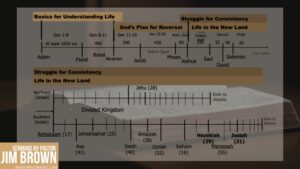
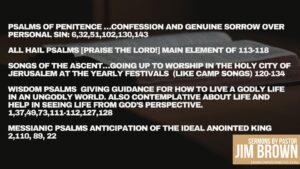
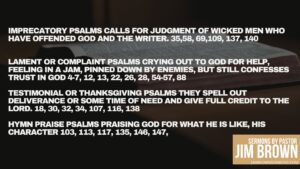
Sermon Slides
Your Subtitle Goes Here
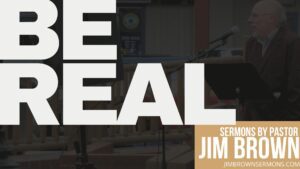
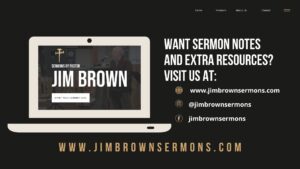

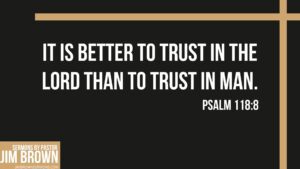
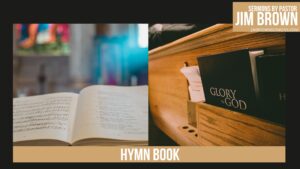
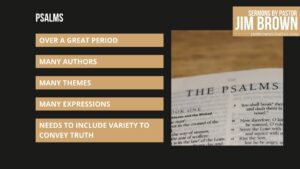
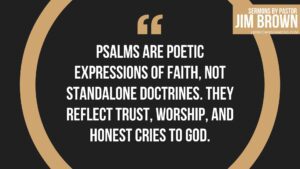
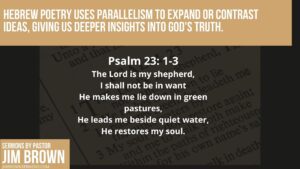
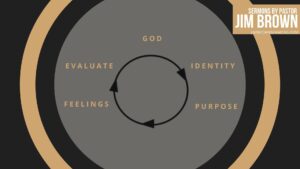
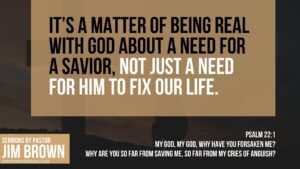
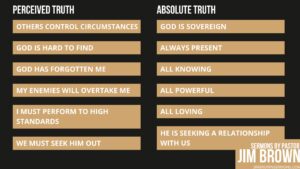


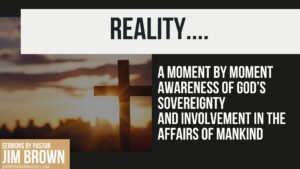
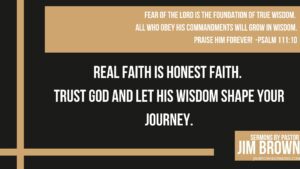


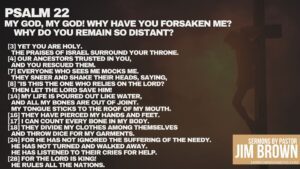
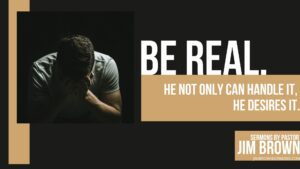
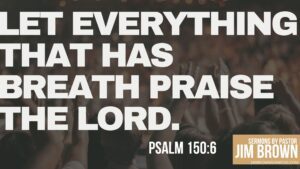
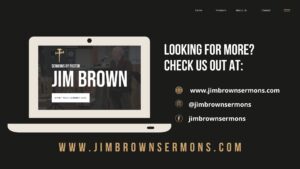
Related Song List
Your Subtitle Goes Here
Recommended Resources
Your Subtitle Goes Here
Books on Psalms and Biblical Wisdom:
-
- The Treasury of David by Charles Spurgeon: A comprehensive commentary on Psalms.
- Reflections on the Psalms by C.S. Lewis: Offers insights into the poetic and spiritual aspects of the Psalms.
*This contains affiliate links, and Sermons by Pastor Jim Brown may earn a small commission from qualifying purchases. All proceeds go directly toward supporting the maintenance and operation of the website. Thank you for your support!
Sermon Transcript
Your Subtitle Goes Here
Be Real | Embracing Biblical Wisdom
Test. Okay. Okay. Why don’t we find our seats? And if you find one closer, that’s okay. Probably the ones that are vacated up here are going to stay vacated. You’re not taking anybody’s seat. As you know, we were in Chicago a couple of weeks ago, and when you don’t spend a lot of time with people, sometimes there’s confusion in terms of communication. Do you ever notice that? And ways we communicate things. And we went back there and we were going to put a big hole in my mom’s wall between her kitchen and dining room. And it should have been a fairly simple job. I had looked at it several times in the past, and so this time we were going to go there, cut the hole and trim it out, and then she’d have a little more interaction with the people in the dining room while she’s in the kitchen.
And so when we went there this time, we went with that mindset figuring it would probably take a day, maybe six hours or so to do it. And I have a nephew who’s in the construction business and he works on homes primarily doing remodeling and building new homes, trimming them out. And the homes he works on are several million dollar homes. So he approaches a project somewhat differently than I do. And so first thing I did is I had my little stud finder and I’m checking the wall out and there seemed to be something in the wall. And so I went in the basement and looked, and there’s duct work running right through where I want to put the hole. So project canceled. I was going to mess with any of that. It was just not going to be an easy job. And my mom was thrilled that I didn’t start cutting before I found that out.
So we put all our little teacups back up on the wall and everything, and then my nephew comes and says, oh, that’s no big deal. I mean, you just move the duct work. And I said, well, yeah, but then you got to take the ceiling out in the dent to run the duct. And he is got this mindset that if somebody wants something done, you do it. And it took us a while to work through the idea that there’s two issues here, time and money. And once we connected on what a common factor could be, then we were able to communicate. And I said, okay, I’ve got six hours and 25 bucks. And he said, project canceled. So that took care of that. Well, Raelynn’s going to read a little story for us that I found in a book that also just shows how we come to different situations with different ideas.
I have never had much interest in science. So when it came to fulfilling the general requirements for my bachelor’s degree, I looked long and hard for the easiest possible solution to that category. It turned out that a neighboring college offered a course in astronomy that would satisfy the obligation I enrolled. The class was held in a theater style auditorium that seated several hundred students on the first day. I sized up the situation and made several observations. First, it was packed with students who had a non-science look about them. I don’t know what that looks like. Apparently I wasn’t the only one looking for a less technical alternative to science. Second, I learned that there would be no final exam as long as I had made an appearance at all the classes I was guaranteed an A for the course. Third, and this is most important, the auditorium filled from the back to the front.
Does that sound familiar? If you arrived early, you could have one of the choice seats high in the nosebleed section, otherwise you could get stuck toward the front. Near the end of the term, the professor carried out an annual ritual by surprising the class with an astronomy aptitude test. As the thick multiple guest questionnaire was distributed, the instructor assured us that this exercise had absolutely no bearing on our final grade. That was good to hear because as I read through the first few questions, I realized that this was a hopeless cause for me with nothing at stake. I decided to speed up the process. It seems that the first answer in most multiple choice exams is D. It is usually followed by an A and then a couple of C’s. So that was the system I put into action. I moved through the pages in record time, ignoring the questions and concentrating on the pattern of the hash marks.
As you might expect, I finished a bit too quickly, so I decided to go back and check my answers. They sounded pretty good to me. By then, a couple of others had turned in their test, so I followed suit and left. I arrived late to the next lecture, true to form. The good seats in the back were taken and the only available space was in the front row as I fumbled with my books and tried not to look too conspicuous, the professor talked about the aptitude test from the previous week. I have given this test to thousands of students. He drowned. But we have someone in this class who has achieved the third highest score of all the students I’ve taught. I wasn’t paying much attention up to that point. But his next question shot adrenaline through my veins is Steve Corch here tonight. I was instantly embarrassed and could feel the heat radiating from my face. I slowly raised my hand as far as my shoulder and every eye converged on my highly visible location. When the instructor spotted me, seated right beneath his nose, his expressionless face suddenly came to life. Please notice where this young man is seated. He pointed proudly out. This proves a theory I’ve held for many years. The brightest students always sit in the front. The B students are right behind them. And so it goes right on up to you people back in the back row.
How many times do we get ourself into a situation without all the facts? What we believe to be true may not always be true. And that’s how we often approach scripture too. Sometimes we approach scripture without having all the facts. So as much as we’ve studied so far in the Old Testament, we’ve been going through it following a timeline. And there it is, and you had this in your bulletin last week. And as it follows the timeline, it also follows the order of scripture that we find it in the Bible. For the most part, it’s all in order. And so what we did, you didn’t really realize this, but I had groups here of what we’re talking about, and the first group was the basics for understanding life. And that is understanding life from God’s perspective. And that takes us from Adam to Abraham. What happened during that period is the fall of man, well creation, then the fall, then things like Babel and God was trying to basically lay out what life is all about.
That basically he is a holy God and we are fallen humanity, unable to approach God by our own efforts. And so that’s what he started us out with Genesis one through 11. And then from there we go to the next section, God’s plan for reversal that because of the fall there has to be some way for man to relate to God. God desires a relationship with all of mankind. So therefore he set a plan in place. And that was through Abraham that the plan of reversal and our ability to come to God was getting started through Abraham and through his line. And then after that was the struggle for consistency. And that’s when Joshua moved into the promised Land and then they occupied the Promised Land. And there was just a struggle to constantly live for God. Even though God had worked, miracle after miracle had provided for their needs, had won their battles and paved the way completely for ’em, there was a struggle for consistency to consistently follow God.
And so that’s what the rest of the book covered. So this next section is we’re going to call Life in the Land, and that really overlaps the time in the land. So the books that we’re talking about next from the Bible are going to be, are books that are more or less written about the life in the land or during the life in the land. So that what it was is during that struggle for consistency. It sort of fills in the blanks of what was going on during that time because there’s still a time period after this and will be covering that in a few weeks. But the time period following this is when, right now, by the end of this timeline, they have ended up in captivity again, in exile. So they’re going to spend some time in exile, then they will be released from exile again.
And so we’ll cover that later. But right now they’re headed towards exile. They’re trying to live in the land with some sort of consistency. So we’re going to look at the Book of Psalms today. The Psalms is one of the books that we’re going to cover during this time of consistency, living for consistency. It’s Proverbs, Ecclesiastes, song of Solomon in all, but seven of the prophets are going to be included during this time as we look at the Psalms. I hope you have your steel toed shoes on. Okay? Because what I’m going to do is I’m going to be stepping on some toes. People have really learned to love the Psalms. They turned as the Psalms often for comfort, for encouragement to express joy and worship to God. They’re very familiar to us, but I’m going to take somewhat of a clinical approach to them at first, just kind of dissect them and look at ’em a little bit differently.
So a little bit of trivia about Psalms. Does anybody know what the shortest chapter in the Bible is? One 17, Psalm one 17. The longest 1, 1 1 19. Okay, very good. So what’s in the between 1 18, 1 18? Did you know which chapter is in the very center of the Bible? One 18. Psalm one 18 is in the very center of the Bible. There are 594 chapters before Psalm one 18, and there are 594 chapters after Psalm one 18. So both of those add up to 1188. Okay, kind of clever. Do you know which is the center verse of the Bible then of one 18? It’s 11.
It’s Psalm 1 18, 8. Okay. It is just kind of coincidental, or is it, did God plan it this way to look at it this way? And so if you wanted to know God’s perfect will for your life, and you turn to Psalm 1 18, 8, it says, it is better to trust in the Lord than to trust in man. Is that right? Is that true? Yes. It’s better to trust in the Lord than to trust in man. Also, the Book of Psalms is five different books. If you look in your Bible at Psalm one, and it’ll say Book one or something on that order, and then at number 42 it’ll say book number two. And then book number three is 73. Book number four is 90. And then the final book five is 1 0 7. And the reason that many scholars feel this way is because these were collected over a period of time, and they’re poetry written by a lot of different people.
So the books of poetry include Psalms, Proverbs, Ecclesiastes, song of Solomon, Ruth, Esther, and Lamentations. You don’t have to remember all those because we’ll be covering them. But there’s many books of poetry. And when we look at the books of poetry, we have to think of them as we would a hymnal in a sense, especially the Book of Psalms. It’s almost like five hymnals. What they did is they collected a group of hymns and a group of poems collected them, put ’em in a book, probably what would fit on a scroll, and said, okay, here’s a hymn book for us to use. And then someone down the road collected some more from different periods of time, put those together and it became another book. And then finally the book of Psalms was written and all those were combined, all five of those books. So like a hymn book.
Has anybody seen one of these lately? We don’t see ’em around here, do we? Very often. But this is a hymn book in case if you want to look at it later, you can. It’ll be available in the museum. In the museum, yes. We don’t use it here, actually. I study out of it and things like that and choose songs from it for us to put on the PowerPoint. But this hymn book is written over a great period of time. The oldest hymn that I was just kind of thumbing through it, trying to see what it was, was written in 3 48 ad.
It was a long time ago, but the book was just published a few years ago. So how old is this book? One would have to ask, is it by its publisher or by its writing? Well, that’s what the book of Psalms is, right? It’s got some psalms that are very old and some songs that are very new. There are a lot of different authors in this book. I counted close to 500 different writers contributed to this book here. So it is with the Psalms. Many different writers contributed to the book of Psalms. There are many themes in a hymnal. You’ll be talking about communion, about Christmas, about praising God, his deliverance, communion, all those different themes are covered in this book. And so they are in the book of Psalms, many different themes. It’s not just one theme.
So the writers of music were expressing themselves to God. That’s what’s important. They were expressing their hearts to God in one way or another, trying to relate something to God that others would understand. And so that’s why we love the songs because it’s written by people trying to relate to God. See, music needs a variety, doesn’t it? If you just pick one song and say, I’m going to base my life on that song, you probably won’t do very well. But if you take all the songs in this book and put ’em together, there’s probably a pretty good accurate representation of how to relate to God and to one another and a good understanding of who God is. But you can’t just pick one song out of the whole thing. It’s similar to the songs we sing here. I pulled a few of them from the past that we’ve been singing. Here’s a song that says, meet with me. We often start the service with it. It says, I’m here to meet with you. Come and meet with me. I’m here to find you. Reveal yourself to me.
And then it goes on to say, as I wait, you make me strong, as I long draw me near to your arms. And then it ends with, won’t you come? Won’t you come and fill this place? Now, if you based your whole theology about God on this, you would think that God isn’t here, wouldn’t you? I’m here to meet with you. God, where are you? You’re not here. I’m here. But you’re not you. See, but we can’t do that. We can’t take one song and say, this represents all of the church or what we represent here with this song. It represents a portion of the truth of God. Because we know that if we’re ready, if we’re here to meet with God, he’s here to meet with us. And so it’s a poetic expression is what it is. And that’s what the Psalms are. They’re poetic expressions.
It’s another one. It is well with my soul, it’s loved song. We’ve been singing it in the church for years. When piece like a river ath my way when sorrows like sea belows roll, whatever my lot thou has taught me to say, it is well, it is well with my soul. And that’s true. It is well with our soul when we go to God. But what if we’re living with sin in our life? What if we haven’t taken care of business? What if we’re living a lie? Can we expect all to be well with our soul just because we’re going to God with our sorrows? Or do we need to confess our sins? You see? So again, we can’t go to God just based on our poetic expressions of the feelings within us, but take all of truth and weigh it up against that.
So music needs variety to adequate quickly convey truth, right? You need a variety. You need quite a bit of it to put it all together. And then you’d probably be discovering more and more truth. You can’t judge an entire church’s beliefs based on a few of the songs they sing. So it’s true with Psalms, it’s very dangerous to go to a psalm, pick it out and say, this represents my relationship with God or what God is like. Just based on what Psalm one Psalm says, oftentimes we read more into a Psalm. Than’s meant to be read because it’s a poetic expression of somebody’s personal experience with God for a particular time. Readers today often misinterpret the Psalms. They go to it not really understanding the poetry behind it. For instance, in Psalm 23, again, a very, very familiar Psalm, the Lord is my shepherd. I shall not want.
He makes me lie down in green pastures. He leads me beside the still waters. He restores my soul. And we have a tendency to take that and pick it apart. And I found several books that do that. And we look at it and we say, okay, what’s it mean to lie down in green pastures or be beside still waters? We try to make each element something that stands alone and dissect it that besides still waters is something different than being in green pastures. And we can do that and get something very helpful out of it. But when this was written, it was written with a very important feature of Hebrew poetry, and that is called parallelism. Try to say that real fast. Five times parallelism. It’s unlike the poems that we’re familiar with that are based on rhymes. What these often do is they’ll expand or contrast a basic idea trying to say the same thing.
So the basic idea is that the Lord’s like a shepherd and he takes care of David’s needs. So all these are other things are expressions of how he takes care of David’s needs. Now, I’m a bit poetically challenged. I don’t know if any of you are, but let me put this in words that maybe you can understand. I’m going to take a shot at my own poetry here based on parallelism, okay? I fill the lawnmower with gas, I pull the rope on the mower and start it. I walk behind the mower, I empty the grass bag. Okay? Now, if you try to take too much out of any one of those statements and analyze it, you could say, well, what kind of gas does he put in it? Do you think it’s high octane? Is it unleaded? And how many times does he have to pull the rope to get it started?
These types of things. You can analyze each thing. Well, what am I trying to get across? I’m cutting the grass. Alright, well, that’s what Hebrew poetry is about. There’s a bigger idea that is expressed in smaller chunks. So keep the big idea, the main idea before taking all these little chunks and dissecting them. You can dissect them and they’re okay to do. It’s good to know what kind of gas to put in your mower. That’s okay. But that’s not the concept that me the poet was trying to get across of how high the octane should be. In the gas of my mower, it was that I’m cutting the grass. So it is with the Psalms that there’s many times this greater idea that we want to lock in on and then see how it’s expressed. There’s an endless variety of these parallels in scriptures. Watch for ’em.
It can be kind of fun to watch what’s paralleled, but then look for what’s the greater idea that God’s trying to get across. There are countless saints and sinners that throughout the centuries have relied on the Psalms to bring them joy, comfort. It’s uplifted their souls. It’s consoled them in many ways. They read it, they meditate on it, and it’s really brought a true depth to our relationship with God by reading the Psalms. So I don’t want to say that we shouldn’t go there, but let’s go there looking for what it is the writers were truly trying to get across with that particular Psalm, but also reading it in light of what the rest of scripture says. That’s what we should do with all scripture is all scripture should be interpreted in the light of other scripture and see what the big picture is of what God wants to say to us.
So don’t get me wrong, I still believe that all scriptures inspired by God and profitable for teaching, for reproof, for correction, training, and righteousness. But specific scriptures have got to be translated in light of the rest of scripture. So the array of feelings that are expressed in Psalms need to be brought into the full circle diagram of the foundational truths. Because otherwise, if you take one little truth and try to run with it and don’t see who God is in the big picture, who we are as a child of God and our purpose, we will struggle. So when we’re dealing with our feelings, whether they’re feelings of joy, sorrow, rejoicing, victory, make the circle complete. Evaluate ’em according to who God is, who we are as a child of God and his purpose for our life. And so it is what the Psalms, because many times the Psalms can be very lead you to desperation if they just stand alone.
But if you take it in its full context of who God is, starting with Genesis, the God, the creator, God almighty God, the God of all the earth, all the universe with all the power, and start reading Psalms making sure that is in place, it’s going to make a difference. There is no desperation there. It’s also real important to keep our themes within the Bible and particularly within Psalms kind of separated and understand those things. So it is with all of life. For instance, with my nephew, I had to remember the main theme here is cheap.
So once we got that established, we could follow through on a plan, and in this case it was cancel the job. But we want to make sure that there’s a main theme that’s established before we keep on moving on and look for those themes. And the real theme is that God is in control of the universe. We start there and we can keep moving along. So a lot of Christians might turn it to Psalms and they want to in a very well-meaning way, help somebody come to know the Lord. And there’s a lot of temptation to say, well, God will lift your depression. He’ll cure your of your loneliness. He’ll cure your diseases. Your hope will be restored because it says in Psalms that God will do all these things for you and this can lead a poor sinner to believe that God is some kind of Mr.
Fix it that Jesus just came to fix your problems. So offering the gospel as the basis for salvation is misleading. Now, God didn’t come to meet our needs. He didn’t come to meet our physical needs. He will meet our needs, but that’s not the reason he came and we shouldn’t mislead somebody to say, God will take care of all your needs if you just accept Jesus. Because what that does is it makes man and his needs the center of the gospel instead of Jesus Christ. Jesus Christ is the very center of the gospel and only a belief in who God is as the Almighty God of the universe, a holy God that we are eternally separated from him by sin, and we need a savior. That is the only way we can come to God. And if we come to him on the basis of felt needs, we will struggle. We need to come to him based on who he really is as almighty God.
So the only way to be reconciled to God is a matter of being real with God about our needs. It’s just not a need for him to fix our lives, but a need that we have to have our sins forgiven because we are separated from him. We need to understand that there’s absolute truth in the Bible that we can always go back to that there’s also perceived truths that are represented and many of those perceived truths are in the book of Psalms. Here’s a perceived truth that others are in control of circumstances. David cries out oftentimes that his enemies are out to get him and they’re going to get him. But the absolute truth is that God is sovereign, isn’t it? That’s what we need to know first. If we understand that God is sovereign, we can go to the Psalms and know that just an poetic expression of desperation is being portrayed, not a doctrinal truth.
How about that? God is hard to find. You’ll find that in the Psalms oftentimes. How does that jive with the fact that God is always present? He’s here, he’s everywhere. How about God has forgotten me? How can God forget anything? He’s all knowing my enemies will take me over. Bible says that God is all powerful or somehow I must perform to high standards to get God to love me. When the Bible actually demonstrates that God accepts us just as we are and there’s nothing we can do to earn God’s love. There’s nothing we can do to make God love us more. He’s done everything to prove his love for us on the cross through Jesus Christ that we must seek him out somehow we’ve got to go out and try to find God. The Bible states that he is seeking us out. He wants a relationship with us. You see, so when we read the Psalms, we need to understand that the writer already had a firm foundation of absolute truth when they were written, and now he’s just expressing some of his current feelings, things that may be perceived to be true at the time, but ultimately going back to the reality of who God is in your bulletin on the back, there’s several types of Psalms that are listed there. I’m just going to run through ’em real quick.
But these are good subjects for us to look for when we read Psalms and for us to personally go to with God, they’re necessary for us to express many of these things that we know we can go to God anytime and express like the first one, Psalms of penance. That’s confession. That we can go to God and confess our sins. He accepts us. We don’t have to make up for him or anything like that. Just go to God admit we’re a sinner. He’ll take care of it that we need Him. All hail Psalms, just hail the name of Jesus, just praise God.
Songs of the ascent. Those were ones that they often sang or chanted as they were going to worship the Lord in the city of Jerusalem. They go in groups and recite these psalms together. They’re sort of like what we would consider camp songs Now, okay, they’re songs that they got very familiar with. They do as families as they traveled up to Jerusalem. Then there’s Psalms of wisdom that gives us guidance for how to live a godly life in an ungodly world and how to make sure that we take God’s perspective into everything we’re doing. There’s Messianic psalms. Now, these are specifically written that they’re looking forward to a messiah. A king is coming, he’s an anointed king and they know it. And there’s Psalms written about how they’re really looking forward to it. Now there’s other psalms and I’ll talk about those in a little while, that often relate to the Messiah, often relate to Jesus, but the writer didn’t know that at the time, that’s not the writer knew a messiah was coming and he specifically was writing about ’em. And then there’s Imprecatory psalms. Those are my favorites. Those are ones of crying out to God. They’re complaining, they’re babbling. They’re just saying, God, do harm to this guy here. Okay? Psalm 1 0 9 is a great one. He’s just saying, my enemies are overtaking me. They’re mean, they’re cruel. They’re calling me names and God, just wipe ’em out. Make their children fatherless, make their wives widows and Lord kick their teeth out.
They’re fun. It’s a true expression of somebody who’s been hurt and don’t get too much doctrine out of it, but it’s just an expression that you can go to God with anything and it’s okay. Go to God with anything we want and he can accept it. And then there’s testimonials or Thanksgiving and that is just, we’ve seen God work and we just want to give testimony to that. And so that’s what those psalms are about. And then there’s some that are just praise. Just praise God for who he is, what he’s done, what he’s like has more to do with his character, how almighty he is. So there is a basic theology that we need to take into reading scripture, particularly the Psalms, because we all have these, what we’ve talked about these in the past, basic assumptions. We all have these things that we come to life and we say, well, based on the way your upbringing is, you might think people are basically good. Somebody else may think that people are basically evil, that those are basic assumptions that seem to carry on into life. We can call that your worldview, those things that shape the way you think.
So what we’re looking for is ways to incorporate God into daily life. That’s the basic theology that God wants to be a part of our lives. So we want to make sure that biblical reality is a part of our reading of the Psalms and that reality is a moment by moment awareness of God’s sovereignty and that he’s involved in the affairs of mankind. That’s reality. That’s a biblical worldview that is, nothing can get truer than that. That if we have a moment by moment awareness of God and his sovereignty, that he’s in control of all things and that he is involved intimately in your life, that’s what he wants you to know. And that’s expressed in a lot of different ways. In Psalm one 10 or one 11, verse 10, it says, reverence for the Lord is the foundation of true wisdom. So it says reverence for the Lord. That’s not just an acknowledgement that God exists. Oh yeah, I believe God’s there. But no a reverence for him. It’s not just toleration putting up with God and his demands. And it’s not just an addition of God to your life saying, okay, I accept the fact that there is a God and I’ll add ’em to my life along with everything else. No, this is a reverence for the Lord.
And it’s expressed in the fact that life and God have got to go together. We can’t live life apart from God and be successful, that he is the creator and those concepts have got to be interwoven in daily life. God and me are going through this together. The psalmists knew that when they were writing, but sometimes it didn’t seem like it. So their emotional expression told about what they were feeling at the time. But they always came around to the truth that God is the redeemer. Only God can save us. We can’t save ourselves that God is always present. This is also something in the Psalms that God is always there. He can’t vanish. He’s here, he’s with you. And that we must live a life of faith that God is always calling us to live by trusting him. That’s what the life of faith is.
It’s not a blind faith in something we can’t see. No, it’s a trust that what God’s word says is true, and we are willing to live our lives according to that. That is what it means to live by faith. So in these expressions of distress that we often read about in the Psalms, we often see it alongside confessions of trusting God. So what we have is distress on one hand, trust on the other. They go together. God can accept the fact that we’re struggling. It’s okay, but we don’t need to think He’s deserted us. It may feel like it and we can express that to him, and that doesn’t upset him. He can take it. He’s bigger than that.
Do you ever have these thoughts of something you’ve heard during the day? Why buy a mattress anywhere else? Did you ever hear that jingles that just kind of gets you thinking and you remember ’em? Raylin and I are products of the sixties and seventies music and how oftentimes that has affected us. Just little things. We’d be doing bills and looking at something and I’d say, well, even though we ain’t got money, the rest of it, if I were a carpenter, would you marry me? Anyway, those types of things. You get these things that stick into your mind, don’t you? Little jingles, stuff like that. How about golden arches? What do you think of? Why Tums? Tums?
Yeah, so these things are what the Psalms were about. In Jesus’ day. People loved the Psalms, they used them, they knew them. They were like those jingles to them. They were very, very familiar with Psalms. It was on the tip of their tongues, I imagine. And you could tell by how often it’s quoted in the New Testament, the Psalms are quoted close to a hundred times directly and then at least 200 more times indirectly just these little phrases and stuff. And what people would be doing is they’d see this phrase and it would remind them of something. It was in Psalms, a truth of God. Because what you do is you hear the beginning of it, and if you keep the thought process going, it makes sense just like it. Even though we ain’t got money, it immediately make the other person think I’m still in love with you, right?
So it is with the Psalms, that’s what people had on their minds because they quoted ’em, they recited them, they memorized them, they sang them to each other. When they traveled up to Jerusalem, the Psalms were on their minds. So imagine yourself as a disciple of Jesus. You’re a Jew. You’re familiar with the Psalms, you walk with him down dusty roads. You just love to listen to him teach. You see him heal people with a very tender touch, and oftentimes he does something that reminds you of one of the sounds or he says something that reminds you of one of the Psalms. And as you spend time with him, you see this more often and more often and you think, is this just a coincidence? How often things that Jesus is doing relates to something in Psalms? It just seems too uncanny that every situation is just right. As you go through the Psalms in your mind and see Jesus reminding you of them, then comes that day. It’s a horrible day. There’s this mock trial. Jesus is brought before the Romans found guilty, crucified.
You’ve been traveling with them. Nothing seems to make sense to you. You’re searching your mind. What’s going on? What’s going on here? Jesus is hanging there on the cross crucified. You’re standing there wondering. Then all of a sudden Jesus says something that draws your mind to Psalm 22. You know what that is? My God, my God. Why have you forsaken me? Why do you remain so distant? Jesus never finished the Psalm. He just started it. Verse three says, yet you are holy. Our ancestors trusted in you. Then it goes on and it starts to talk about the scene there. It says, everyone who sees me mocks me in the Psalm 22.
And it even says that. People said, is this the one who relies on the Lord? Let the Lord save him. And you just heard the Pharisees say that to Jesus. It says in Psalm 22, my tongue sticks to the roof of my mouth. And you think of Jesus hanging there saying, I’m thirsty. They’ve pierced my hands and feet. In verse 16, verse 24 brings the hope for he has not ignored the suffering of the needy. He has not turned away and walked away. He listened to the cries for help. For the Lord is king, he rules the nations. See, by relating his experience to Psalm 22 and connecting this human desperation with God’s eternal purpose, do you think God can understand your feelings?
Jesus was just expressing something that was very, very deep to him at that time. Was he separated from God? Well, God’s always present. He didn’t cease to become a member of the Trinity at that point, did he? No. But there was a distance there that was felt because of your sins and my sins. Jesus was carrying sins at that moment. He was being judged for being a child abuser, for being a thief, for being a liar, for being a cheat. Everything that we’ve done, he was being tried for at that moment, and it was distance between him and a holy God. A felt distance and he was expressing it in the deepest way He knew. But at the same time, just as the rest of the Psalms, that desperation was not hopeless. His hope was still in the Father. That’s where our hope is. Our hope is in the Father. We need to come to him with everything.
When we express ourselves to him, it may be a sense of desperation, but it doesn’t have to be a sense of distrust. We know he’s there. We know because of what the rest of scripture says, and sometimes it’s just that kind of trust is what he’s looking for in our times of need, our times of desperation to call out to him so that he can meet that need. You think God understands your feelings this time of year we’re reminded by a lot of feelings going around. A lot of people have good feelings. A lot of people have dark feelings. They just don’t know what to do with this season. It reminds us that Jesus came as a baby so that God can make himself real to us. He always has been real, but now we see him as a person, as a baby. He breathed our air.
He’s felt our pain. He knows our sorrows. He died for our sins. He knows what it’s like. A baby displays the ultimate expression of real feelings, don’t they? It talks about letting you know what’s on their mind. It comes out pretty clear without reservation. That’s how God came to us without reservation, and he wants us to come to him without reservation. Let it all out. Be real. Be real with God. He can handle it. There’s overwhelming needs around us right now. There always seem to come up more and more at Christmas time. Sometimes it’s being people who are helpless, hopeless, homeless. There are people who are hardened and bitter. Maybe you’re fortunate enough to come to this time of the year with joy and praise. That’s good too. The Psalms are all about that. To bring it all to God, our joys, our sorrows, our pain, our bitterness, bring it all to him. He can handle it because we can remember Jesus came and related to us as a person at this time of year, allow this time of year to be real with God just as he became real to us. The very last verse of the Psalm, Psalm one 50 verse six says this, praise the Lord. Let everything that has breath praise the Lord. Let’s pray.
Lord, we don’t always know how to express ourselves to you. I thank you that you’ve given us some models in the Psalms. We can come to you and even read the words of others, but when they come from our heart, Lord, you know it. So I pray we won’t take just a clinical approach to understanding your word. But Lord, we will understand more and more every day how totally human you are and how totally God, and that when we come to you, Lord, it’s because you’ve already come to us. We thank you for your presence with us, that you are not a far off God. You are not a God who we need to try to please. But Lord, you are pleased because of what’s been done in Jesus Christ. So you’re pleased with us. So we praise you that it’s no longer up to us, Lord. That’s all been taken care of. We thank you in Jesus’ name. Amen.
Original Sermon Date: 12/04/05
© 2024 Sermons by Pastor Jim Brown www.jimbrownsermons.com All rights reserved.

BE REAL: EMBRACING BIBLICAL WISDOM
In a world that often prizes appearances and quick fixes, the call to Be Real with God stands as a timeless and transformative truth. This message explores how the Psalms—rich with poetic beauty and raw emotion—offer a blueprint for honest faith. Through their wisdom, we discover what it means to trust in God fully, embrace authentic worship, and navigate life with Biblical wisdom as our guide. Let’s dive into the heart of this powerful message and uncover its significance for our spiritual journey.
The Call to Be Real with God
“Are you ready to get real about your faith?” This question, posed at the start of the sermon, hits at the core of our spiritual lives. To Be Real with God is to embrace authenticity—not hiding behind facades but bringing every emotion, joy, and struggle to Him.
In the same way that a heartfelt conversation deepens a human relationship, being real with God strengthens our connection with Him. Faith isn’t about perfection; it’s about honesty. As Psalm 22:1 expresses, “My God, my God, why have you forsaken me?” David’s cry isn’t a lack of faith—it’s a profound trust that God can handle his rawest emotions.
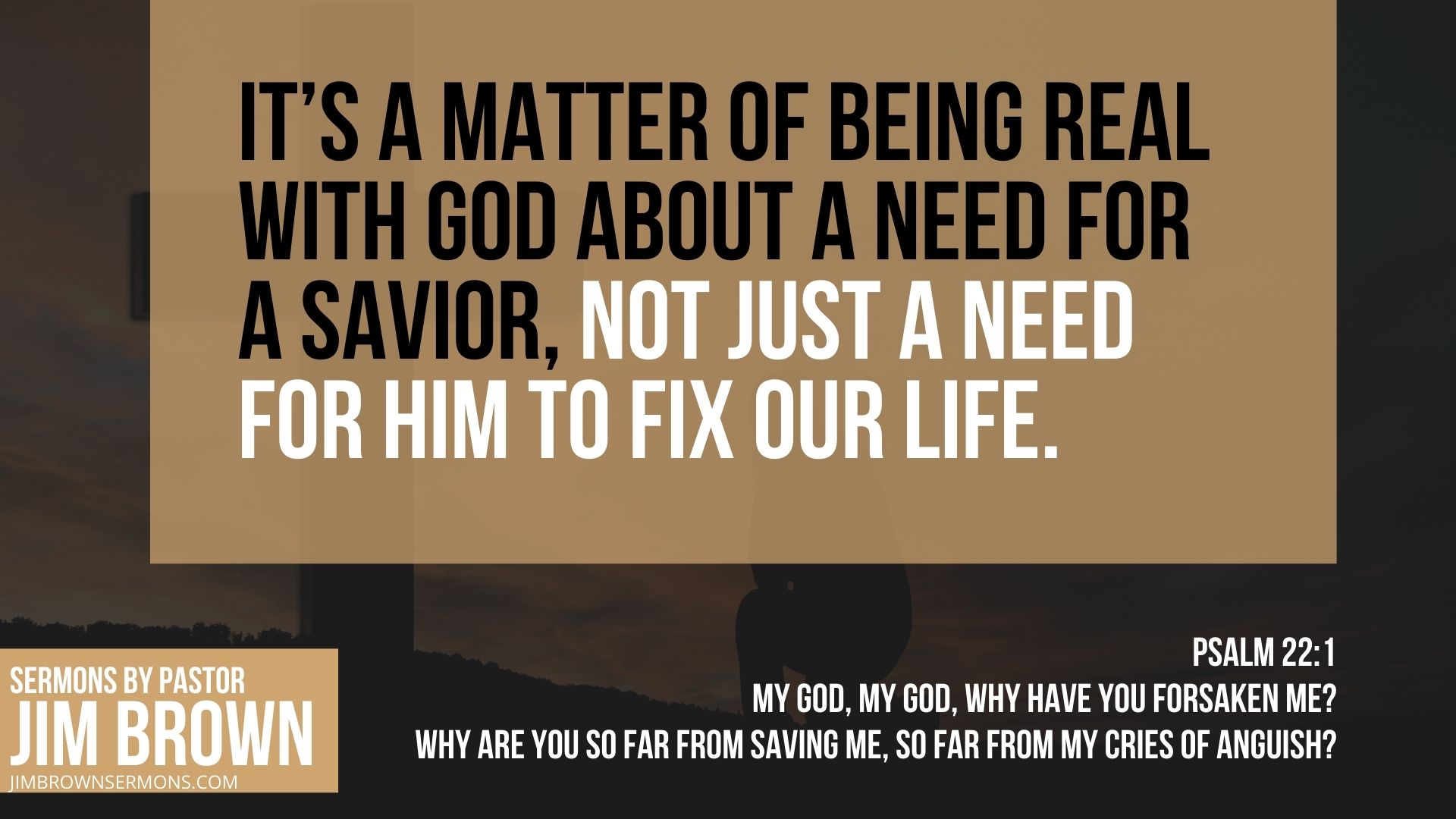
Understanding Biblical Wisdom in Psalms
The Book of Psalms is one of the most beloved parts of scripture, but it’s also one of the most misunderstood. Often seen as a collection of comforting verses, the Psalms are much more—they are expressions of real human experiences aligned with divine truth.
What Is Biblical Wisdom?
Biblical wisdom isn’t about quick answers; it’s about seeing life from God’s perspective. It calls us to trust Him even when our understanding falls short. As Psalm 118:8 reminds us, “It is better to take refuge in the Lord than to trust in humans.”
The Psalms give us a roadmap for this kind of wisdom. They teach us how to approach life with honesty, how to worship with reverence, and how to anchor our trust in God’s character.

The Beauty of Hebrew Poetry
The Psalms use a literary device called parallelism, where ideas are expanded or contrasted to provide deeper insight. For example:
- Psalm 23 begins, “The Lord is my shepherd; I shall not want.” This isn’t just poetic imagery; it’s a declaration of God’s provision and care.
- Each line builds on the next, painting a picture of God as our faithful guide through life’s valleys and green pastures alike.
Understanding this poetic structure helps us grasp the full depth of the Psalms and apply their truths to our own lives.
.
Honest Faith: God Can Handle It
The Psalms show us that it’s okay to bring everything to God—our fears, frustrations, and failures. Psalm 22, for example, begins with despair but transitions into hope and trust.
Key Takeaway:
God invites us to come to Him just as we are. Be real in your prayers, and trust that He hears you. This is the essence of Biblical wisdom—anchoring your emotions in the truth of who God is.
The Types of Psalms: Expressions of Faith
The Psalms encompass a variety of themes, each reflecting a unique aspect of our relationship with God:
- All Hail Psalms: [Praise the Lord!] Main element of 113-118
- Songs of the Ascent: going up to worship in the Holy City of Jerusalem at the yearly festivals (like camp songs) 120-134
- Wisdom Psalms: giving guidance for how to live a Godly life in an ungodly world. Also contemplative about life and help in seeing life from God’s perspective. 1,37,49,73,111-112,127,128
- Messianic Psalms: anticipation of the ideal anointed king 2,110, 89, 22
- Imprecatory Psalms: calls for judgment of wicked men who have offended God and the writer. 35,58, 69,109, 137, 140
- Lament or Complaint Psalms crying out to God for help, feeling in a jam, pinned down by enemies, but still confesses trust in God 4-7, 12, 13, 22, 26, 28, 54-57, 88
- Testimonial or Thanksgiving Psalms They spell out deliverance or some time of need and give full credit to the Lord. 18, 30, 32, 34, 107, 116, 138
- Hymn Praise Psalms: praising God for what He is like, His Character 103, 113, 117, 135, 146, 147,
These categories remind us that faith isn’t one-dimensional. It’s dynamic, messy, and beautiful.
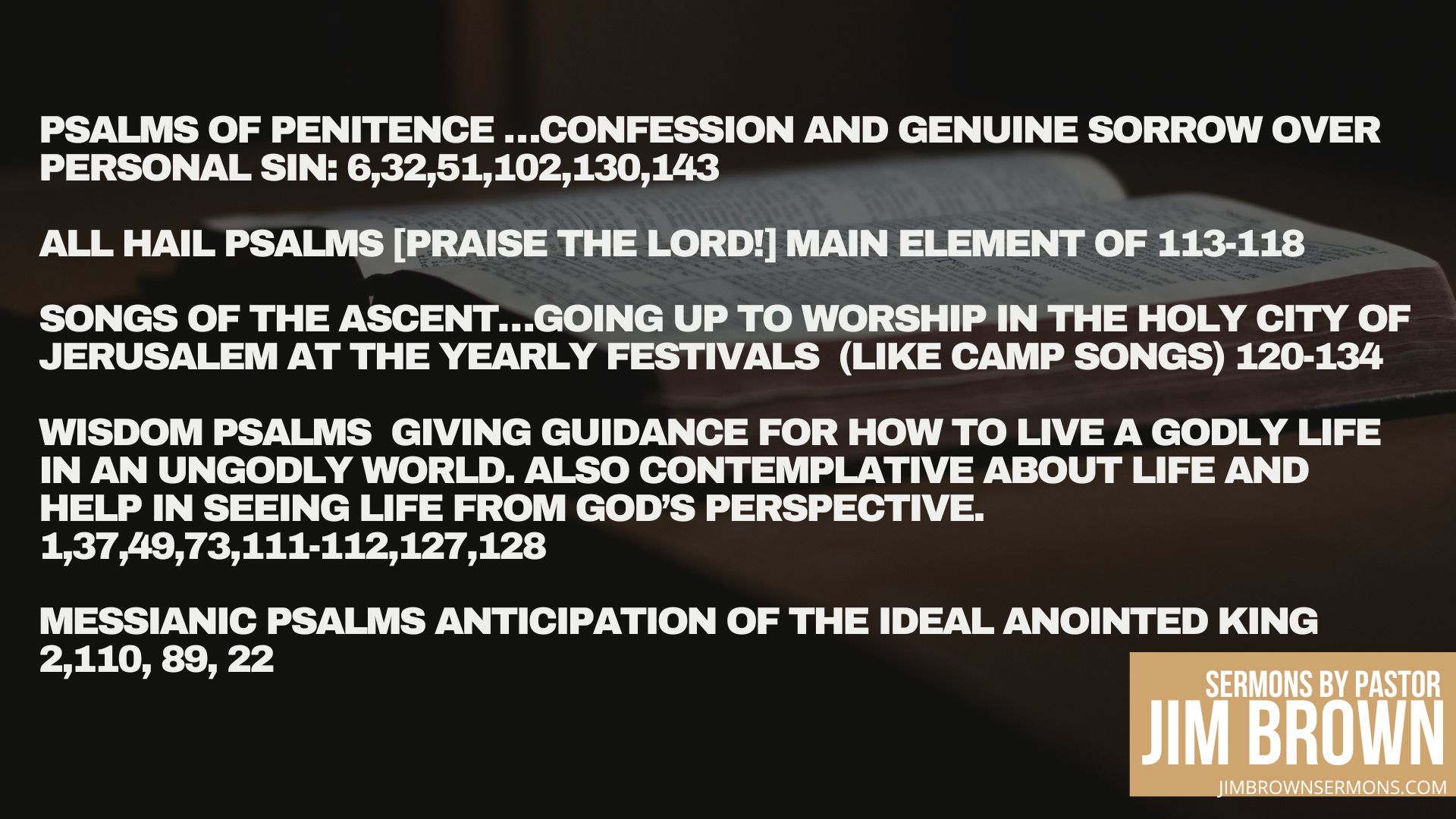
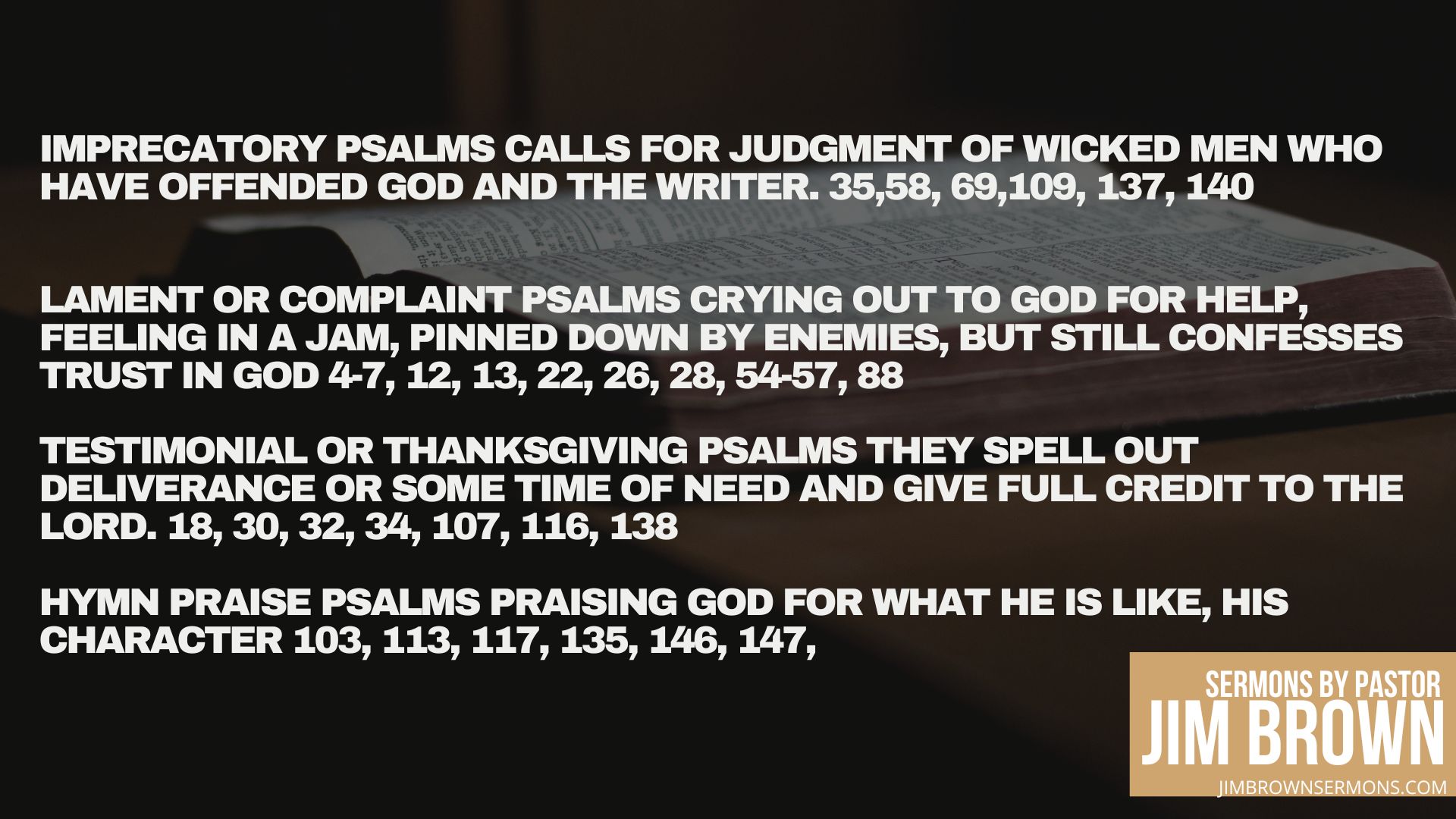
Living Out Biblical Wisdom
To live with Biblical wisdom is to approach life with God’s truth as your foundation. This means:
- Trusting in God: Even when circumstances seem uncertain, we anchor our hope in His promises.
- Embracing Praise and Worship: Worship isn’t just about music; it’s about aligning our hearts with God’s greatness.
- Seeking Guidance from Scripture: The Psalms provide a wealth of wisdom for navigating life’s complexities.
Key Verse: Psalm 111:10 – “Fear of the Lord is the foundation of true wisdom.”
Real Faith in Action
Real faith requires us to engage with God honestly. It’s not about putting on a show but about bringing your whole self to Him.
Practical Applications:
- Start your day with a Psalm to center your heart on God.
- When overwhelmed, pray honestly—just as David did in Psalm 22.
- Use Psalms scriptures as a foundation for personal reflection and worship.
The Power of Praise and Worship
Praise and worship play a vital role in expressing our faith. They remind us of who God is and realign our perspective.
Key Insight:
Even when life feels chaotic, worship shifts our focus from our problems to God’s sovereignty. Psalm 150:6 says it best: “Let everything that has breath praise the Lord.”

Conclusion: Be Real with God
The message of this sermon is clear: Be real with God. Bring your emotions, your questions, and your praise to Him. The Psalms teach us that Biblical wisdom isn’t about having all the answers—it’s about trusting the One who does.
As we dive into Psalms scriptures, let’s remember the beauty of their honesty and the depth of their wisdom. Let’s embrace the call to Be Real and let our faith flourish through authentic trust in God.
Final Thought:
God is big enough to handle your doubts and tender enough to hold your heart. Be real, be honest, and let His Biblical wisdom transform your life.
Original Sermon Date December 11, 2005
© 2024 Sermons by Pastor Jim Brown www.jimbrownsermons.com All rights reserved.
RECENT SERMONS
Ep 21: HEARTS OF STONE | Dependence on God Unlocks Transformation
When faith over feelings fails, dependence on God unlocks true transformation. Grow stronger in faith and prayer through this powerful Christian podcast.
DEV 1: WHEN YOU’RE TIRED OF HOLDING IT ALL TOGETHER | Trust In God
Feeling overwhelmed? Learn how to trust in God, surrender control, and find peace through this encouraging devotional based on Haggai 1:5.
Ep 20: Back TO BASICS | The Life-Changing Call to Surrender to God
When life feels off track, it’s time to surrender to God. This powerful message reveals how faith, identity, and revival begin with full surrender.
Ep 19: IT’S ALL DOWNHILL FROM HERE | Submit to God for Real Freedom
Ep 18: THINKING BACK LOOKING AHEAD | God’s Love Never Fails
Find hope in the midst of uncertainty as this sermon reveals how God’s love, mercy, and faithfulness remain steady—even when life doesn’t go as planned.
EP 17: WE NEED A KING | Finding True Security in God
Feeling lost and insecure? True security in God comes from trusting Him completely. Learn how seeking God brings peace and strength.

